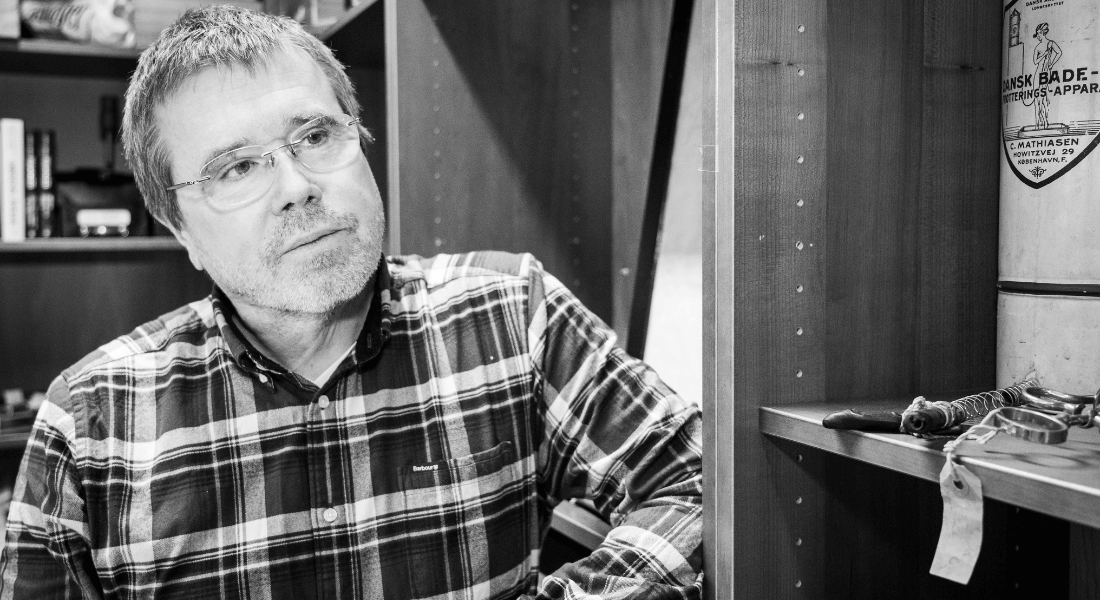"Signs of a crime are visible on the body years after it has been committed”
Steen Holger Hansen has been in Ukraine together with a team of forensic technicians. Here he helped investigate war crimes that Vladimir Putin is accused of having committed.

When most people hear the words “forensic medicine”, their minds go to sterile rooms, steel tables and autopsies. But forensic medicine also involves examining bodies with beating hearts. This is known as clinical forensic medicine, and Steen Holger Hansen has specialised in the field.
Steen Holger Hansen’s office at the Department of Forensic Medicine is full of objects from his career – brutal objects like machetes and battle clubs.
Since 1998, he has worked at the University of Copenhagen, today as deputy state-appointed forensic pathologist. This means that Steen Holger Hansen helps the Ministry of Justice in special cases.
He therefore travelled to Ukraine in fall 2023 as part of a larger team.
“My job was to evaluate the use and quality of clinical forensic medicine in Ukraine to ensure that the Ukrainian authorities are capable of satisfying the burden of proof the day Putin arrives at The Hague,” he says.
Because the International Criminal Court (ICC) in The Hague has accused Russian President Vladimir Putin and Commissioner for Children’s Rights Maria Lvova-Belova of war crimes. More specifically, they are accused of being responsible for the forcible removal of thousands of Ukrainian children to Russia.
They are really good guidelines, but they only focus on the physical injuries. When these children return, which we hope they will, they may be in poor mental health, and this needs to be documented systematically by a psychiatrist
Together with five police officers, Steen Holger Hansen spent four weeks in Ukraine assisting in the investigation. They had been sent to Ukraine by the Danish state on behalf of the ICC.
“It is the first time I have been sent to a conventional war between two countries. And war was a constant presence. The Danish National Police went to great lengths to keep us safe, and every day we faced air raid warnings and had to take shelter,” Steen Holger Hansen says.
This is not the first time Steen Holger Hansen has participated in international missions. In the past, he has been dispatched to countries like Kosovo, Afghanistan, Cambodia and Rwanda to assist in the investigation of war crimes and assaults on the local population.
The body can carry evidence of war crimes
The exact number of children forcibly removed from Ukraine to Russia is unknown. The Ukrainian government has documented more than 19,000 cases, but believe there to be an unreported number of cases, and that the figure may be closer to 30,000 children.
“Once the children who have been transported through occupied Ukraine and Russia return, which we hope they will, we can examine them for signs of systematic violence, sexual assault and other cruelties,” Steen Holger Hansen explains.
Because the body can carry signs of assault – long after they have been committed.
“In Rwanda and Cambodia, I examined victims of assault years after they had been committed. So yes, even though they fade over time, the signs of a crime are visible on the body and mind years after it has been committed,” Steen Holger Hansen explains.
The Istanbul Protocol
During his four-week visit to Ukraine, Steen Holger Hansen spoke to forensic pathologists, investigators and prosecutors, and he got the impression that the Ukrainian system is geared for supporting the ICC investigation of Putin and Lvova-Belova.
But there are challenges too. Ukraine has produced its own guidelines based on the official UN guidelines for medical documentation of war crimes, the so-called Istanbul Protocol.
“They are really good guidelines, but they only focus on the physical injuries. When these children return, which we hope they will, they may be in poor mental health, and this needs to be documented systematically by a psychiatrist,” Steen Holger Hansen says.
Therefore, he advised the ICC to support the involvement of mental examinations of the victims and assist Ukraine in photo-documenting their physical injuries.
“They provide high-quality descriptions of injuries, but people in The Hague who read these reports will benefit from photo documentation. It is partly a matter of resources,” he says.
Eventually, Steen Holger Hansen hopes his recommendations will strengthen the investigation of the accusations against Vladimir Putin og Maria Lvova-Belova.
When he was in Kosovo for the ICC, the material he helped collect was used e.g. in the trial against Former Serbian President Slobodan Milosevic, who was accused of war crimes.
“Milosevic died before he could be convicted, but some are still in prison. So it can be done. I am motivated by a desire to help the ICC investigate these types of cases.”
Contact
Steen Holger Hansen
Steen.Holger.Hansen@sund.ku.dk
+45 35 32 61 85
Journalist and press consultant Liva Polack
Liva.polack@sund.ku.dk
+45 23 68 03 89
